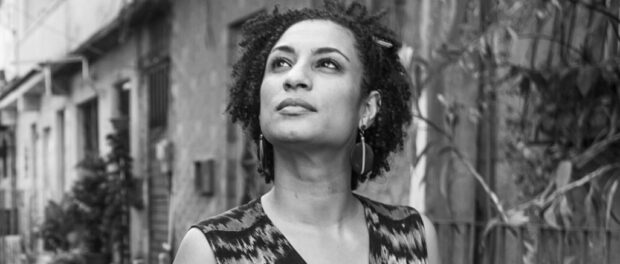
“To be a black woman is to resist and survive at every moment.” The phrase was said by Marielle Franco, a woman who would change the course of Brazilian political history, in an interview given to Brasil de Fato as part of a series on women’s struggles, in March 2017. Today, this is the premise of black women in politics. They are the seeds planted by Marielle Franco, born and bred in the anti-racist struggle for human rights, gender equality and democracy in Brazil.
The low representation of black women in political spheres has always been an obstacle. The disparate nature of the occupation of decision-making spaces continues to be fed by social exclusion, rooted in the racism and sexism that structure society. In the 2020 elections, men were 84% of the city councilors elected in Brazil. Among the 16% of women councilors elected, 59% were white women and 34% were black. This means that for every 100 city councilors elected in the country in 2020, only 16 were women and, of these, only five were non-white, even though black women comprise the largest demographic group in the country—28% of the population. These data resulted from a survey conducted by UN Women in partnership with Gênero e Número, from data provided by Brazil’s Superior Electoral Court (TSE).
Though the percentage of women elected in 2020 was low, it was higher than in the previous election. In 2016, only 13.5% of elected councilors were women. In this context, Marielle Franco, born and raised in the favelas of Complexo da Maré, in Rio de Janeiro’s North Zone, did not allow herself to be silenced, whether socially or politically. Her path led to the acknowledgement of the importance of the black, favela woman for the strengthening of democracy. State deputy Renata Souza and city councilor Mônica Cunha, who was also founder of Movimento Moleque, are two black women who were shaped by the struggle for rights and who had their lives marked by Marielle Franco and her legacy.
“Marielle Showed that Black Women from the Peripheries Know How to Do Politics”
Mônica Cunha is a human rights defender and social educator. In 2003, she founded Movimento Moleque to combat the abuse suffered by adolescents complying with juvenile detention measures. Her activism started there, when her son Rafael da Silva Cunha, as a teen, committed a nonviolent crime. Later, in December 2006, at age 20, he was murdered by the Civil Police, which intensified Cunha’s fight into a lifelong mission.
Meu filho Rafael da Silva Cunha foi assassinado no dia 5 de dezembro de 2006, aos 20 anos. Mas minha militância não começou com a morte dele, e sim quando ele tinha 15 anos e foi cumprir medidas socioeducativas em um estabelecimento do Degase, no Rio de Janeiro. 👇🏿 pic.twitter.com/5EOOl8dIV6
— Monica Cunha (@monicacunhario) August 22, 2020
My son Rafael da Silva Cunha was murdered on December 5, 2006, at age 20. But my militancy did not start with his death and rather when he was 15 and went to fulfill socio-educational measures at a DEGASE unit in Rio de Janeiro.
Cunha met Marielle Franco when Marielle was responsible for the Human Rights Commission in the Rio de Janeiro State Legislative Assembly (ALERJ), to seek help for cases of abuse and violence suffered by adolescents in juvenile detention under the care of the General Department of Socio-Educational Action (DEGASE). After their first encounter, Cunha met with Marielle a few more times, attending the Commission’s meetings, drafting bills aimed at the juvenile justice system’s measures, in addition to participating in the development of public hearings about the subject. Thinking through the politics of Rio’s juvenile justice system became a common link between them. Through her political action, Marielle supported the mothers of Movimento Moleque and encouraged, maybe without realizing, Cunha’s political empowerment.
In 2016, Marielle applied to run for the position of City Councilor for the City of Rio and invited Cunha to help her with the campaign, making her responsible for the agenda of juvenile justice measures. Cunha immediately accepted because she felt that Marielle, as a black woman from the favela who sacrificed a lot to raise her daughter, understood what mothers go through to raise their children inside the favela. Cunha identified with Marielle. She did not see any issues in engaging with the campaign and supported the candidacy with great fervor. She attended the campaign’s committee meetings, and with that, they came even closer.
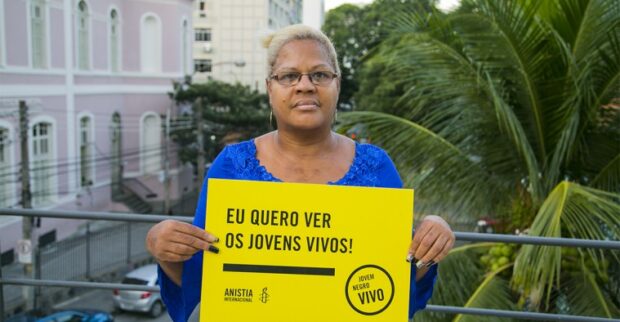
With tireless effort, Marielle managed to claim a seat in the city council as the 5th most voted councilor in the municipality of Rio. Emotional with the victory, after watching the counting at home, Cunha recalls taking a moto-taxi and going straight to Cinelândia, in Central Rio. She came to Marielle and hugged her euphorically, saying they had won the election. From then on, she was certain that everything they had talked about during the campaign would happen. Cunha says that, at the time, she was very happy knowing that she helped elect a black woman from the favelas.
The strength of Marielle’s political representation made Cunha realize that black women do deserve to occupy political positions, challenging narratives and leading spaces mostly dominated by white men. “Marielle’s term in office was a learning experience. It made me realize that black women can and know how to do politics,” says Cunha. In her assessment, it was clear that the members of the Rio de Janeiro City Council felt uncomfortable knowing that Marielle had claimed a seat in that space: “Marielle made people uncomfortable when she walked down the city council’s corridors with her voluminous hair, height, and colorful clothes,” her friend remembers.
Marielle brought together different groups and people around her to do politics. Working closely with the parliamentarian gave Cunha an even greater understanding of the place of black people in politics and how urgent it was for black people, especially women, to occupy this space. She remembers a specific conversation with Marielle, in which the councilor said that it was time, after 20 years of activism, for Cunha to run for council.
At first, Cunha rejected the idea. She did not think she would be able to tolerate the racist stances and speeches from other members of the city council. Her denial was promptly contested by Marielle: “No, you’ll learn! You learned to live all these years without your son, you’re in this world without the one you love most. So, how can you not learn to live in that city council? A hostile place, but one that is ours, one that we have to take up.”
Cunha started to think about the idea, but when Marielle was murdered, on March 14, 2018, she completely gave up. The following year, Marcelo Freixo, federal deputy for Rio also encouraged her. According to Cunha, Freixo said that she was more than ready to take this step. He also said that people should understand the murder of Marielle as a legacy: the legacy of black women in politics. The loss of Marielle was a turning point for Cunha and she started her campaign for councilor for the 2020 elections. She was convinced of what she wanted to do, and, more than ever, she was sure that the “place of women is in politics, especially black women!”
Spaces for Visibility, Memory and Mobilization
“The fact is that [we are] constantly threatened, and I’m one of them. And that happens because we’re the ones who really know how to do politics, not just from books, but from practice. We’re the ones who get on crowded buses, who take our kids to school, who do the grocery shopping, who talk to the next-door neighbor, who go up and down the favela. In other words, we’re the ones who actually live life. So it’s obvious that we’re the ones who know what’s best for the people.” — Mônica Cunha
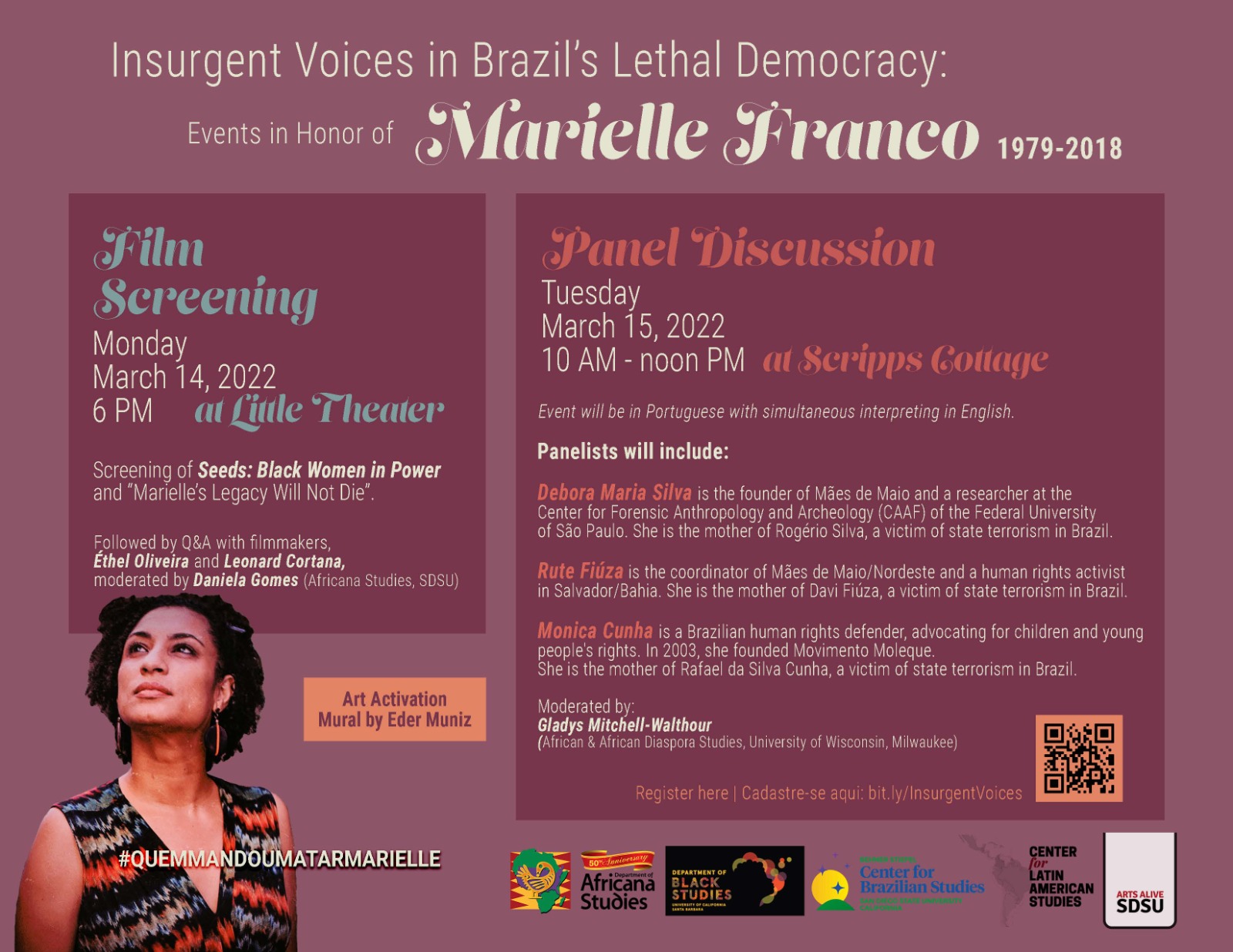
On the anniversary of Marielle’s assassination, March 14, Cunha was in the United States participating in a discussion panel “Insurgent Voices in Brazil’s Lethal Democracy: Remembering Marielle Franco” at San Diego State University. Other than Cunha, Débora Maria Silva and Rute Fiuza, mothers to Rogério Silva and Davi Fiuza, victims of the genocide of the black population promoted by the Brazilian State, were also in attendance. Their presence at the event had the objective of denouncing the murder of black youth, as well as other human rights violations committed in Brazilian favelas.
State Deputy Renata Souza was in New York in the same period, participating in a demonstration in memory of Marielle Franco and denouncing, internationally, the lack of answers to this day with regard to who ordered the murder of the councilor and human rights defender, and why. The deputy also met with Mayor Ras Baraka of Newark, New Jersey, to discuss reducing police lethality and incarceration of black youth. According to Souza, Newark has many Brazilian and Portuguese immigrants and it is not difficult to find a Brazilian steakhouse in the city where Portuguese is almost a second language. The deputy pointed out that there, the majority of the secretariat at city hall is comprised of black women.
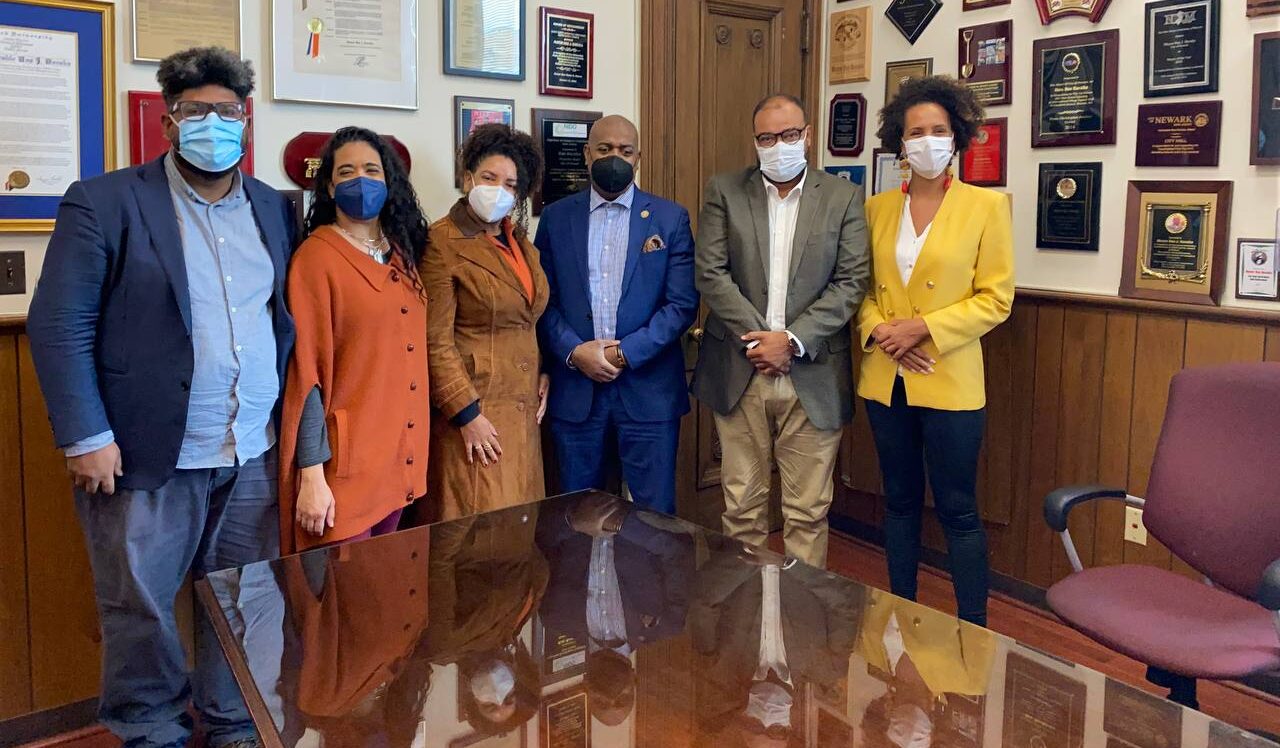
It was survival that motivated Renata Souza’s anti-racist struggle. A black woman and feminist, like Marielle born and raised in Maré, the human rights defender learned how to do politics in the favela before becoming Marielle’s Chief of Staff. Souza followed an activist path common to black women in Rio’s peripheries: she started by occupying spaces of activism in her territory and fighting for social rights for her community, learning, living, and fighting for human rights in practice.
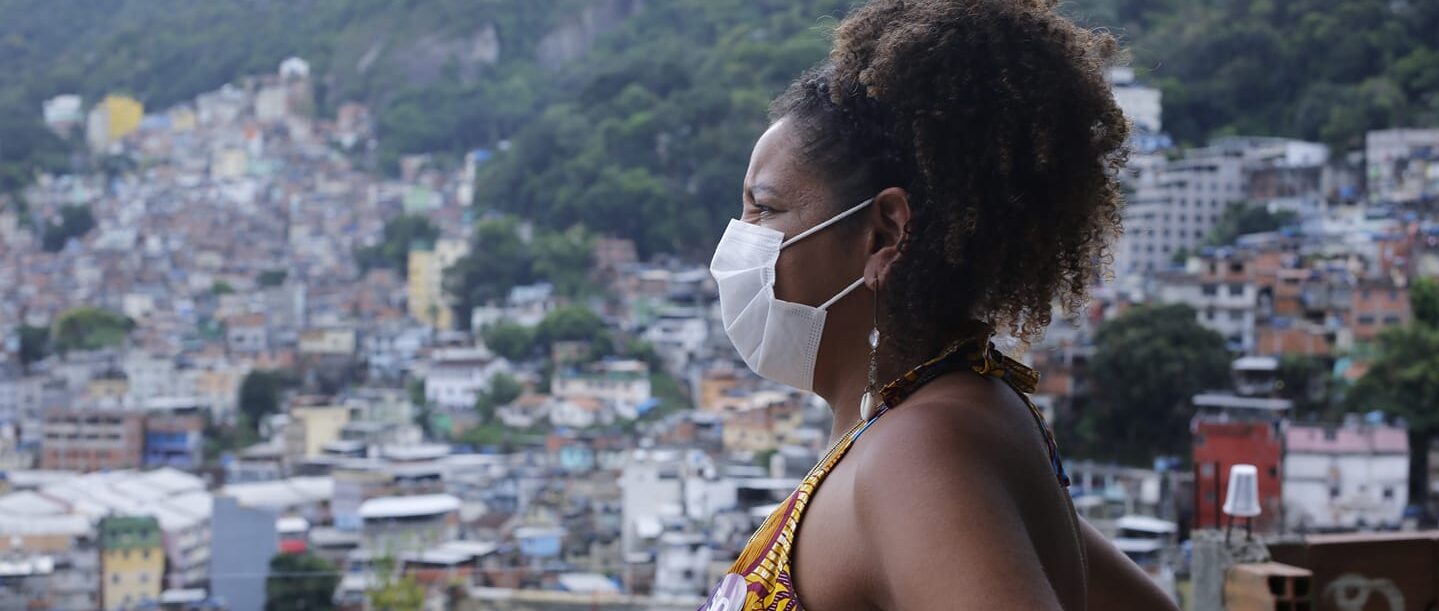
At 16, Souza was already involved with institutions operating in Maré, promoting access to education and culture. She met Marielle at a community-run college exam preparatory course. Her connection with the social movements was great. She decided to join forces for the anti-racist struggle within favelas. “At the time, everyone said it was a fight against the murder of young black people,” recalls Souza, who now realizes that it is an even broader fight, one that impacts, above all, black favela women. “If we are fighting against racism, we are talking about this woman’s right to not lose her child, who is also black, to police violence. We are also talking about this woman who lost her black partner to police violence,” explains the deputy.
Political Violence Against Black Female Legislators
Marielle died due to political violence. Black women that occupy positions of power in Brazil repeatedly face threats and are victims of political violence. A study conducted by the Marielle Franco Institute, published in 2021, found that 98.5% of the 142 black women in elected office interviewed reported having suffered more than one type of political violence. Online violence (78%), moral or psychological violence (62%), and institutional violence (53%) were the most frequently mentioned violations. In August of last year, Renata Souza suffered political violence from a fellow deputy during a session at ALERJ, and had no right to respond during the plenary.
“With every act of political violence, I am more certain that it is in the legislature that we should be, as it is one of the essential tools in our fight. The more black women in the legislature, the better.” — Renata Souza
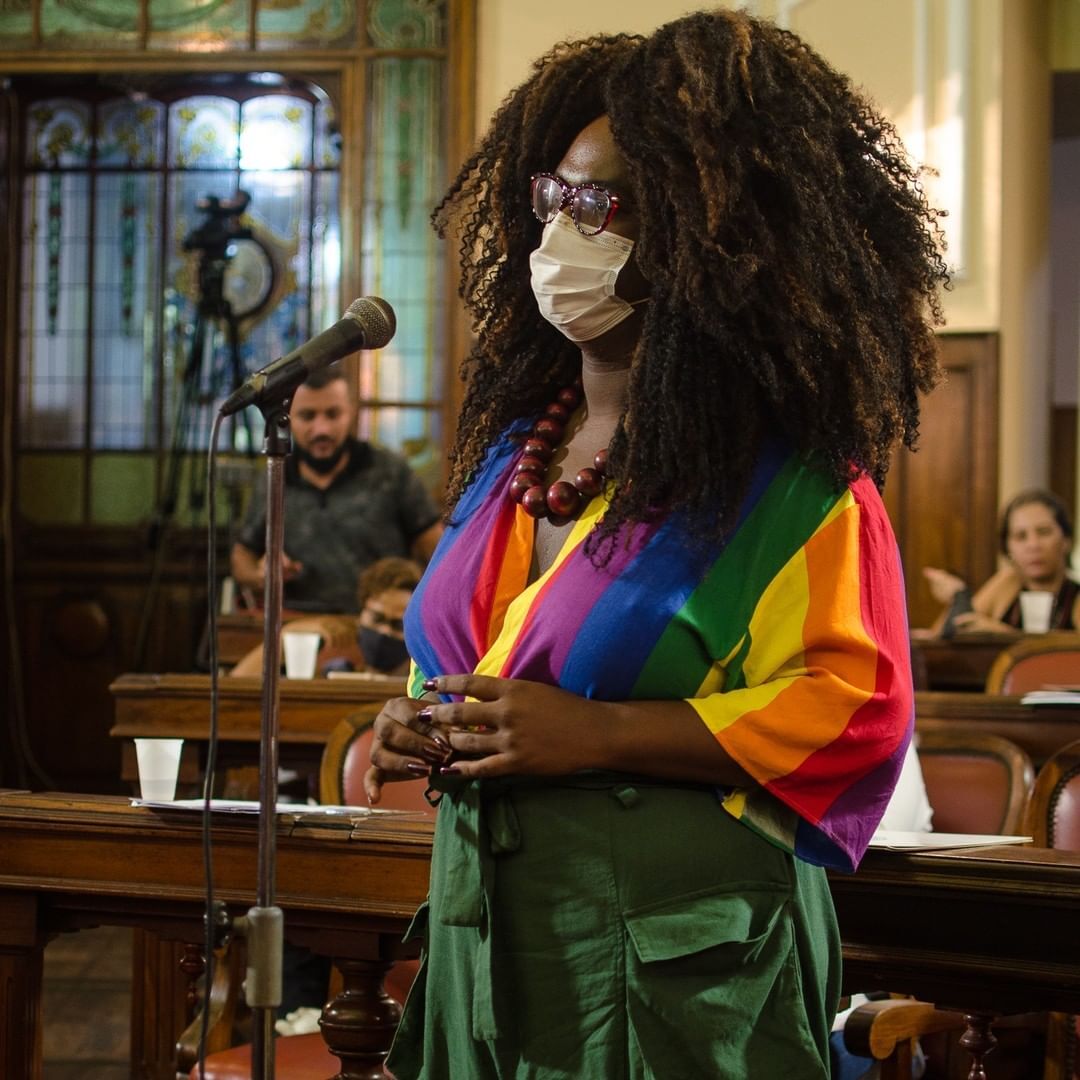
Cases of violence against non-white women in politics are frequent. Just this year, Benny Briolly, a city councilor in Niterói, Rio’s sister city across Guanabara Bay, was the target of six death threats. In less than a year, according to the legislator’s team, there were 20 threats to Briolly’s life, a black trans woman and a child of the favelas. Briolly has already been attacked in the plenary session many times and even had to leave the country for some time to protect herself from death threats. Federal Deputy Talíria Petrone also had to leave the state of Rio after death threats. Disque Denúncia (a crime-stopping hotline) received information that the militia was planning the execution of the legislator, who had to leave during a period of legislative activism and activities.
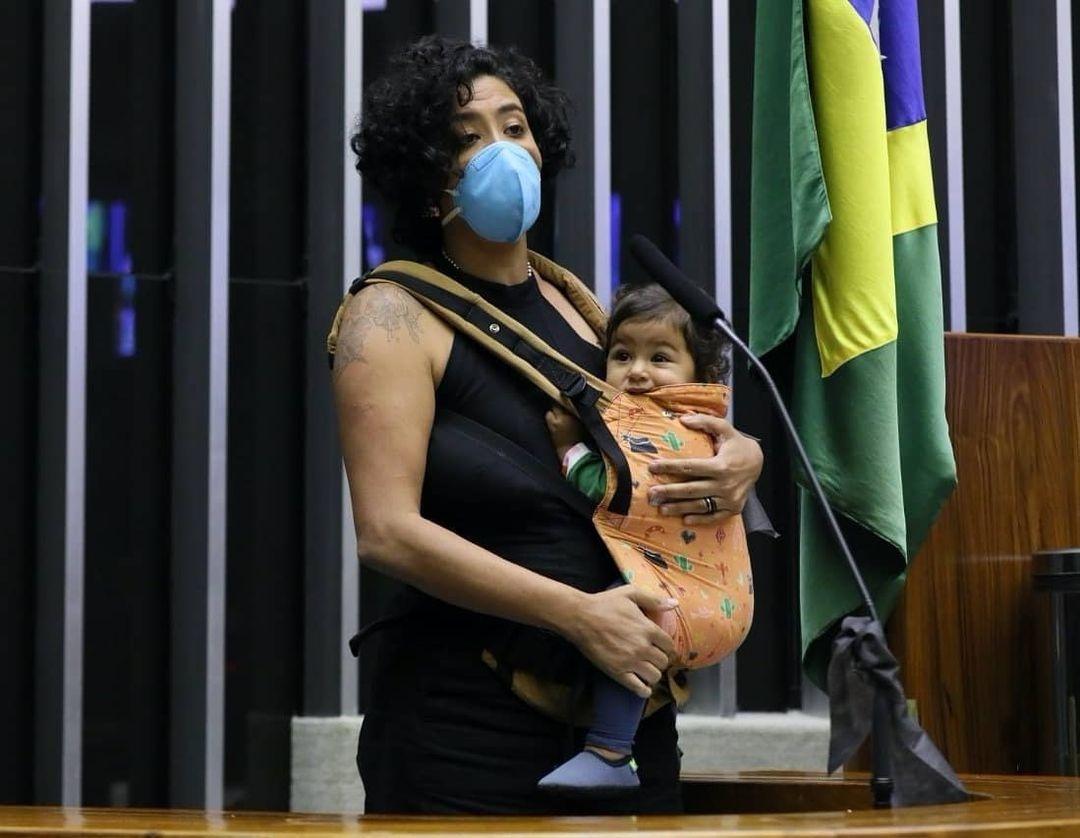
Black women face an enormous challenge within Brazilian legislatures. Souza confirms that this space in politics is historically denied to women, especially to black women and those from the favelas: “it is a hostile environment, but, in fact, with every hostility and act of political violence, I am more certain that this is where we should be so that the legislature becomes a tool of the institutional struggle against racism, machismo, misogyny, and LGBT-phobia itself,” said Souza.
The presence of women in positions of power does not directly translate into a greater representation of agendas. As Souza explains, many women who act as deputies come from political families. They are, therefore, “heirs to family politics, political heirs to their husbands and fathers. They are hardly ever political heirs to a social movement, to a social cause.” The state deputy from Maré concludes: “We [black women] do not enter the legislature inheriting politics, we enter to subvert it.”
About the author: Camila Fiuza is a a journalist, graduate of the Federal University of Bahia (UFBA), and the product of public schools. She is a member of the Northeastern chapter of the Mothers of May. A black, peripheral woman who fights for human rights and against racism, Fiuza has contributed to community radio programs and worked for Record TV Itapuã and Band News FM Radio, in Salvador.
